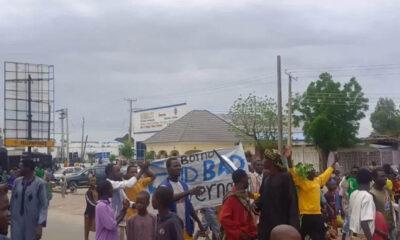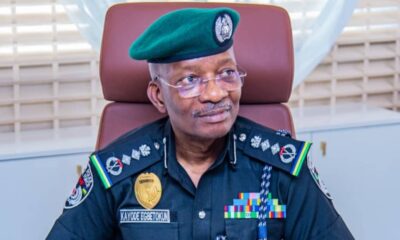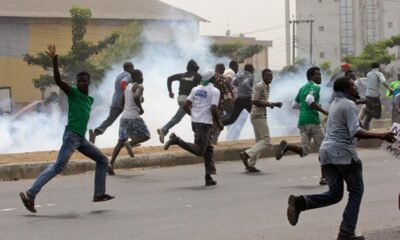International
Tension as gunshots rock 2 Jewish schools in Canada

Tension as gunshots rock 2 Jewish schools in Canada
Prime Minister of Canada, Justin Trudeau and Premier François Legault on Thursday condemned two overnight incidents that saw Montreal Jewish schools targeted by gunfire.
Trudeau said he was “horrified” by the news, which has sparked tension in Montreal.
“I want to be very clear: We condemn this antisemitic violence in the strongest possible terms,” Trudeau said at a housing press conference he and Legault attended in Longueuil on Thursday morning.
“This hatred has no place here in Montreal, in Quebec or in Canada,” Trudeau added.
“We have to remember who we are. I know emotions are running high — that people are fearful, they’re in mourning. But to attack one another as Canadians, it’s not what we do.”
The incidents came days after two West Island Jewish institutions were targeted by firebombs. On Monday, incendiary devices were left at the Beth Tikvah synagogue and a nearby Jewish community centre.
Legault also condemned the “terrible, horrible” acts involving Jewish schools, as well as a violent confrontation between pro-Israel and pro-Palestinian groups at Concordia University in Montreal on Wednesday.
“It’s unacceptable, it’s tolerance zero,” Legault said, adding he wants police to keep an eye on the situation.
He appealed for calm and did not rule out banning demonstrations.
“We don’t want hatred and violence in Quebec and we won’t tolerate this. The message must be clear: I understand that we’re seeing horrible scenes on TV, but we have to at a certain point be able to talk to one another calmly.”
READ ALSO:
-
(BREAKING) Kogi guber poll : Military arrests Navy Commander, 10 other personnel
-
Association of married women that share young boys among themselves exist in VGC – Slayqueen
-
Nigeria, Saudi Arabia sign MoU on energy sector cooperation
Mayor Valérie Plante also condemned the “disturbing” incidents.
“Antisemitism, like any other demonstration of hatred and violence, has no place in our society,” she said via social media.
‘A form of terrorism’: Drainville
In Quebec City, Education Minister Bernard Drainville said the incidents at the Jewish schools are unacceptable.
“Honestly, I am very worried,” Drainville said. “When people start to shoot at schools, it’s serious. This is not Quebec.
“When you start shooting at schools, it’s a form of terrorism,” he said. “We cannot cave into this.”
Drainville added: “The increase in antisemitism, the increase in hate actions and speech against the Jewish community is something which is very worrisome. It must stop
“We firmly condemn these acts. It is unacceptable. We stand wholeheartedly with the Jewish community. We stand wholeheartedly with these children, the personnel, the parents.”
Drainville noted the schools remain open but with increased security.
Christopher Skeete, the provincial minister responsible for the fight against racism, offered the government’s support to the Jewish community.
Both of the incidents occurred at schools in Côte-des-Neiges—Notre-Dame-de-Grâce borough.
Montreal police said the first incident was brought to the attention of Montreal police around 8:20 a.m. after employees at the Talmud Torah Elementary School on St-Kevin Ave. noticed a bullet impact on the school’s door.
The second event was reported to police at 8:50 a.m., when a bullet impact was found on the door of the Yeshiva Gedola-Merkaz Hatorah school on Deacon Rd.
Police perimeters have been set up at both schools, canine units deployed and police intend to examine local surveillance cameras in an effort to determine how and when the shootings occurred.
No injuries were reported in either event, which occurred as local tensions are high and have occasionally broken into incidents of violence as the Israel-Hamas conflict continues.
READ ALSO:
-
AfCFTA: Increase exports, stop relying on imported goods, Bello, Oscar, Sheidu-Shabi advise Nigerians
-
Rivers, Imo get new commissioners of police
-
Our visa centres in Lagos, Abuja remain open, says Canadian High Commission
Officials at both schools are expected to issue statements concerning the shootings later on Thursday.
Jewish group urges vigilance
In an email sent to members of the Jewish community, Yair Szlak, the president and CEO of Federation CJA, a Jewish community group, confirmed that a single bullet was fired at the entrance doors of both schools.
No one was in either building at the time of the events, and there was minimal damage, he wrote.
“These facilities are secured and students and staff are all safe,” the email read.
Szlak said he requested increased police presence around all Jewish institutions, and that there will be more private security personnel and increased safety measures around schools, synagogues and daycare centres.
“We recognize this situation presents a significant change to our security situation,” Szlak wrote. “We are working on all fronts to address the matter. We understand that this adds stress and anxiety to our community members. We urge you to continue to take part in Jewish life while remaining vigilant at all times.”
He encouraged anyone seeing anything suspicious to call the police and to send any relevant photos or videos to Federation CJA.
“We are not going to answer all uploads, but as we gather data and information, it is helpful for us to see what you witnessed once you are safe and are able to share,” he wrote.
Via social media, Sonny Moroz, the city councillor for Snowdon, said: “I am very concerned about the shooting at Jewish schools in Côte-des-Neiges—Notre-Dame-de-Grâce. I am immensely relieved that no one was in the buildings. Violence should never be a tool. It is intolerable. Montreal must remain a city of peace.”
Rachel Bendayan, the MP for Outremont riding, where one of the schools is located, said: “People are scared right now. I am appealing for calm in the interest of the safety of our entire community.”
Tension as gunshots rock 2 Jewish schools in Canada
(Montreal Gazette)
International
UK visa: British govt raises financial requirements for students, workers

UK visa: British govt raises financial requirements for students, workers
International students and skilled workers applying for visas to the United Kingdom will face higher financial requirements beginning January 2, 2025.
These changes, announced by the UK government, require applicants to show more money in their bank accounts to cover living expenses during their stay.
These updated regulations affect those hoping to study or work in the UK, with new financial thresholds set for students and skilled workers.
These changes are aimed at ensuring that applicants have the necessary financial resources to support themselves during their time in the UK.
Increased financial requirements for students
International students seeking a UK study visa will now need to show higher amounts of money to cover their living expenses. For students attending courses in London, the required amount is £1,483 per month, while students studying outside London will need to show £1,136 per month, TravelBiz reports.
READ ALSO:
- EFCC will bring down towers of corruption this year – Olukoyede
- Two online scammers arrested in Rivers for defrauding woman of N110m
- I stand by my comments – Bauchi gov replies Presidency
For a typical one-year master’s program, students must show £13,347 if studying in London, and £10,224 for those outside London. The funds must be held in the applicant’s bank account for at least 28 consecutive days before submitting the visa application.
Comparison with current financial requirements
According to reports, currently, the financial requirements are lower. For students in London, the monthly amount is £1,334, while those studying outside London need to show £1,023 per month. Under the new rules, these amounts will increase, placing additional financial burdens on prospective students.
Changes to skilled worker visa financial requirements
Skilled workers applying for a visa to the UK will also face new financial thresholds. According to reports, to qualify for a skilled worker visa, applicants must have an annual income of at least £38,700 to cover living expenses and accommodation. In addition, applicants must secure sponsorship from an employer approved by the Home Office.
Like student applicants, skilled worker visa applicants must demonstrate that they have the required funds in their account for at least 28 consecutive days before submitting their application if they do not have employer sponsorship.
Updated UK visa fees and exemptions
Visa application fees for 2025 have been revised to reflect inflation and improved services. The new fees for various visa categories are as follows:
- Short-term Visit (6 months): $153
- Long-term Visit (2 years): $573
- Long-term Visit (5 years): $1,023
- Long-term Visit (10 years): $1,277
- Skilled Worker Visa: $827
- Student Visa (Outside UK): $647
- Parent of Student Child Visa: $845
Priority visas are priced at $550, while super-priority visas cost $1,050. However, certain groups such as individuals with disabilities, carers, and professionals in specific sectors like healthcare, the armed forces, and talent-based roles will continue to benefit from fee waivers.
The 28-day rule for financial documentation
A key new regulation is the “28-day rule”. Applicants must ensure that the required funds remain in their bank account for at least 28 consecutive days, without dipping below the required amount.
Bank statements or certified letters submitted as part of the financial documentation must show that the closing balance is no older than 30 days when the visa application is submitted. Failure to comply with this rule may result in visa rejection
UK visa: British govt raises financial requirements for students, workers
International
Moscow attacks Ukraine with drones, missiles
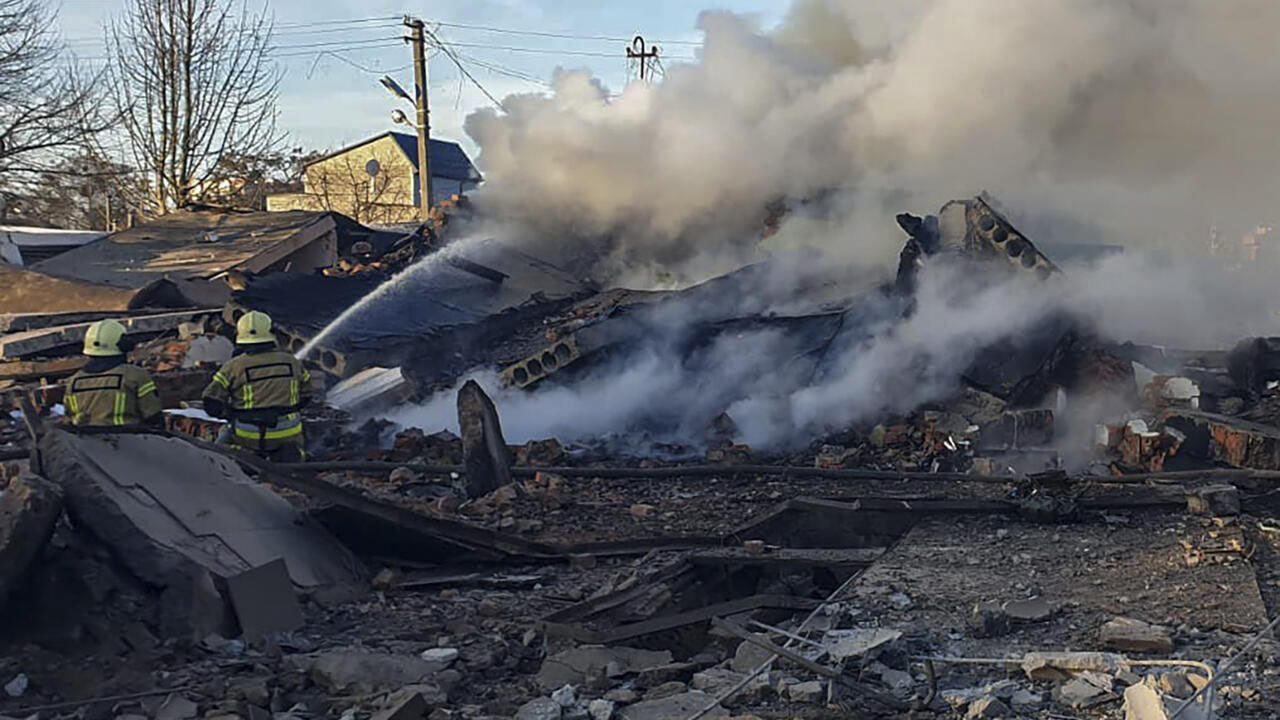
Moscow attacks Ukraine with drones, missiles
Kyiv said Tuesday that Russia had launched a barrage of drones and missiles across Ukraine, conceding that there were successful strikes in the east of the country and near the capital.
Authorities did not elaborate on what had been hit but in the wider Kyiv region, the governor said debris from a downed projectile had damaged a private home and wounded a woman.
Moscow said its forces had used attack drones and precision weapons in a “combined” assault on a military airfield and a munitions production facility, claiming that the targets were struck.
READ ALSO:
- Wanted terrorist commander, Bello Turji, a dead man walking – DHQ
- Court orders forfeiture of $49,700 linked to former INEC official
- DSS arrests activist Shehu Mahdi over post on French military base
The Ukrainian air force said Russia had launched 21 missiles of various types and 40 drones in the barrage, adding that seven missiles and 16 unmanned aerial vehicles were downed.
“As a result of the Russian attack, there were ballistic missile hits in Sumy and Kyiv regions,” the air force said.
Russia has launched aerial attacks on Ukraine at night almost every day since its forces invaded in February 2022, targeting military and civilian infrastructure, too, like energy facilities.
Ukraine has stepped up its own drone and missile attacks inside Russian territory in response, and urged its Western allies to supply more air defence systems.
A Ukrainian drone attack in western Russia caused a fuel spill and fire at an oil depot, a Russian regional governor said earlier Tuesday.
Moscow attacks Ukraine with drones, missiles
International
Catholic priest sentenced to 11 years for criticising his president
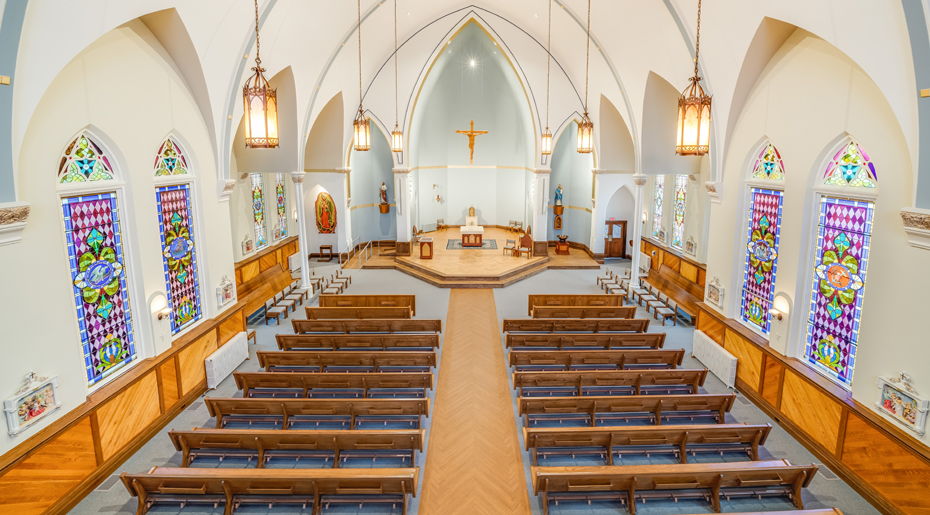
Catholic priest sentenced to 11 years for criticising his president
A Catholic priest in Belarus on Monday was convicted on charges of high treason for criticising the government and handed an 11-year sentence, in the first case of politically-driven charges against Catholic clergy since Belarus became independent after the Soviet Union collapsed in 1991.
The conviction and sentencing of Rev. Henrykh Akalatovich comes as Belarusian authorities have intensified their sweeping crackdown on dissent ahead of the Jan. 26 presidential election that is all but certain to hand authoritarian President Alexander Lukashenko a seventh term in office.
The Viasna Human Rights Centre said Akalatovich, 64, rejected the treason charges. The group has listed him among 1,265 political prisoners in the country.
“For the first time since the fall of the Communist regime, a Catholic priest in Belarus was convicted on criminal charges that are levelled against political prisoners,” said Viasna’s representative Pavel Sapelka. “The harsh sentence is intended to intimidate and silence hundreds of other priests ahead of January’s presidential election.”
Akalatovich, who has been in custody since November 2023, was diagnosed with cancer and underwent surgery just before his arrest. The priest from the town of Valozhyn in western Belarus, who was critical of the government in his sermons, has been held incommunicado, with prison officials turning down warm clothing and food sent to him.
Arkatovich is among dozens of clergy — Catholic, Orthodox and Protestant — who have been jailed, silenced or forced into exile for protesting the 2020 election that gave Lukashenko a sixth term. The disputed vote that the opposition and the West said was marred with fraud triggered mass protests,. The authorities then responded with a sweeping crackdown that saw more than 65,000 arrested and thousands beaten by police.
Catholic and Protestant clergy who supported the protests and sheltered demonstrators at their churches were particularly targeted by repressions. Belarusian authorities openly seek to bring the clergy into line, repeatedly summoning them for “preventive” political talks, checking websites and social media, and having security services monitor sermons.
While Orthodox Christians make up about 80% of the population, just under 14% are Catholic and 2% are Protestants.
Lukashenko, who has ruled Belarus for nearly 30 years and describes himself as an “Orthodox atheist,” lashed out at dissident clergy during the 2020 protests, urging them to “do their jobs,” and not fuel unrest.
Lukashenko is one of Russian President Vladimir Putin’s closest allies, allowing Russia to use his country’s territory to send troops into Ukraine in February 2022 and to deploy some of its tactical nuclear weapons in Belarus.
Catholic priest sentenced to 11 years for criticising his president
-

 Politics3 days ago
Politics3 days agoGbajabiamila speaks on his rumoured Lagos governorship ambition
-

 metro3 days ago
metro3 days agoFarotimi to pursue disbarment over arrest, defamation allegations
-

 Business2 days ago
Business2 days agoReal reason Dangote, NNPC drop petrol price — IPMAN
-

 Health2 days ago
Health2 days agoABU Teaching Hospital will begin kidney transplant in 2025 – CMD
-

 Sports1 day ago
Sports1 day agoAnthony Joshua prostrates before Governor Abiodun during Ogun visit
-

 metro3 days ago
metro3 days agoEl-Rufai accuses Tinubu govt of Yoruba agenda, Reno Omokri reacts
-

 metro3 days ago
metro3 days agoNigerian govt urged to intervene in Mozambique post-election violence
-
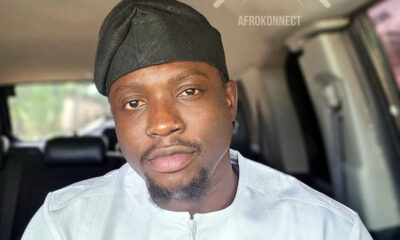
 metro1 day ago
metro1 day agoN180m not missing from my account, it was all a plan – Verydarkman

